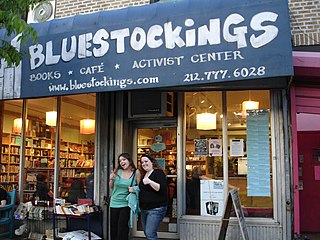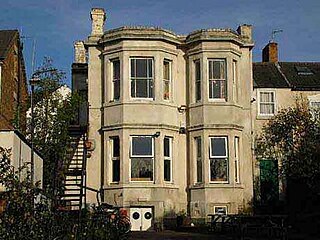Libertarian socialism is an anti-authoritarian and anti-capitalist political current that emphasises self-governance and workers' self-management. It is contrasted from other forms of socialism by its rejection of state ownership and from other forms of libertarianism by its rejection of private property. Broadly defined, it includes schools of both anarchism and Marxism, as well as other tendencies that oppose the state and capitalism.
The WOMBLES were a loosely aligned anarchist and anti-capitalist group based in London. They gained prominence in the early 2000s for wearing white overalls with padding and helmets at May Day protests, mimicking the Italian group Tute Bianche.
The London Action Resource Centre (LARC) is an anarchist infoshop and self-managed social centre situated in Whitechapel, in the East End of London. Previously a school and a synagogue, it was purchased in 1999. It hosts meetings and events from various groups and is part of the UK Social Centre Network.

SchNEWS was a free weekly publication from Brighton, England, which ran from November 1994 until September 2014. The main focus was environmental and social issues/struggles in the UK – but also internationally – with an emphasis on direct action protest, and autonomous political struggles outside formalised political parties.

The London Lesbian and Gay Centre was a lesbian and gay community centre located at 67–69 Cowcross Street, London. It was established in 1985 by the Greater London Council (GLC), which donated three-quarters of a million pounds to its establishment.

Infoshops are places in which people can access anarchist or autonomist ideas. They are often stand-alone projects, or can form part of a larger radical bookshop, archive, self-managed social centre or community centre. Typically, infoshops offer flyers, posters, zines, pamphlets and books for sale or donation. Other items such as badges, locally produced artworks and T-shirts are also often available. Infoshops can also provide printing and copying facilities for people to produce their own literature or have a meeting space.

Bluestockings is a radical bookstore, café, and activist center located in the Lower East Side of Manhattan, New York City. It started as a volunteer-supported and collectively owned bookstore; and is currently a worker-owned bookstore with mutual aid offerings/free store. The store started in 1999 as a feminist bookstore and was named for a group of Enlightenment intellectual women, the Bluestockings. Its founding location was 172 Allen Street, and is currently located a few blocks east on 116 Suffolk Street.

Self-managed social centres in the United Kingdom can be found in squatted, rented, mortgaged and fully owned buildings. These self-managed social centres differ from community centres in that they are self-organised under anti-authoritarian principles and volunteer-run, without any assistance from the state. The largest number have occurred in London from the 1980s onwards, although projects exist in most cities across the UK, linked in a network. Squatted social centres tend to be quickly evicted and therefore some projects deliberately choose a short-term existence, such as A-Spire in Leeds or the Okasional Café in Manchester. Longer term social centres include the 1 in 12 Club in Bradford, the Cowley Club in Brighton and the Sumac Centre in Nottingham, which are co-operatively owned.

The Sumac Centre is a self-managed social centre in Nottingham, UK. It provides resources, meeting spaces and workshops for groups and individuals, and supports campaigning for human rights, animal rights, the environment, and peace. It is part of the UK Social Centre Network and the radical catering group Veggies is based at the centre. It receives no regular funding, the core groups each pay rent that goes toward the mortgage and running costs. Some of the groups are run by volunteers. Its origins can to traced to the Rainbow Centre, which was established in 1984.

Anarchism in Australia arrived within a few years of anarchism developing as a distinct tendency in the wake of the 1871 Paris Commune. Although a minor school of thought and politics, composed primarily of campaigners and intellectuals, Australian anarchism has formed a significant current throughout the history and literature of the colonies and nation. Anarchism's influence has been industrial and cultural, though its influence has waned from its high point in the early 20th century where anarchist techniques and ideas deeply influenced the official Australian union movement. In the mid 20th century anarchism's influence was primarily restricted to urban bohemian cultural movements. In the late 20th century and early 21st century Australian anarchism has been an element in Australia's social justice and protest movements.

The 1 in 12 Club refers to both a members' club and the building in which it is based, in Bradford, West Yorkshire, England. Owned and run by its membership as a collective based upon anarchist principles, its activities include social and political campaigning—most visibly as a hub for the city's May Day activities—and use of the building as a self-managed social centre and host for performing arts. In the 1980s it was one of the main locations for the UK crust and anarcho-punk scene, and in the 1990s played host to much of the country's straight edge metalcore scene.
Harry Cowley was a working class organizer, social activist and anti-fascist in Brighton, England.
Brighton Voice was an alternative or underground newspaper published in Brighton, England in the 1970s and 1980s.
The Autonomous Centre of Edinburgh, also known as ACE, is an infoshop and autonomous social centre in Edinburgh, Scotland. It was founded in 1997, although it follows on from previous groups.
Self-managed social centers, also known as autonomous social centers, are self-organized community centers in which anti-authoritarians put on voluntary activities. These autonomous spaces, often in multi-purpose venues affiliated with anarchism, can include bicycle workshops, infoshops, libraries, free schools, meeting spaces, free stores and concert venues. They often become political actors in their own right.
Base for Anarchy & Solidarity in Easton, commonly known as BASE, is an anarchist community co-operative and self-managed social centre in Easton, Bristol, England. Formerly known as Kebele, the building was squatted in 1995.
The Libertarian Book Club and Libertarian League were two postwar anarchist groups in New York City associated with Sam and Esther Dolgoff.

Housmans is a bookshop in London, England, and is one of the longest-running radical bookshops in the United Kingdom. The shop was founded by a collective of pacifists in 1945 and has been based in Kings Cross, since 1959. Various grassroots organisations have operated from its address, including the Gay Liberation Front, the Campaign for Nuclear Disarmament, and London Greenpeace. Housmans shares its building with its sister organisation Peace News.

Wooden Shoe Books and Records, also known as The Wooden Shoe, is an anarchist bookstore and infoshop in Philadelphia. Founded in 1976, the store specializes in radical and non-traditional literature. Wooden Shoe is run by an all-volunteer worker collective that encourages community building and anti-capitalist activism.










